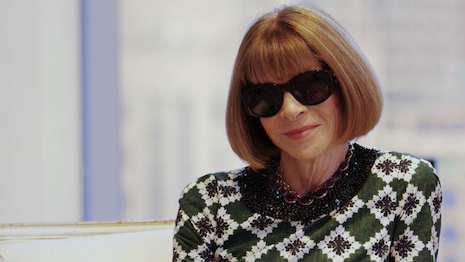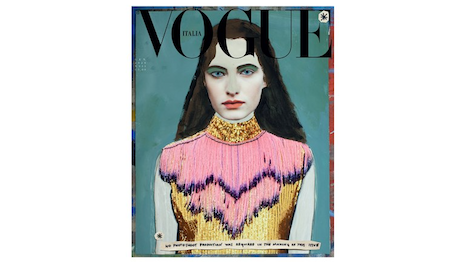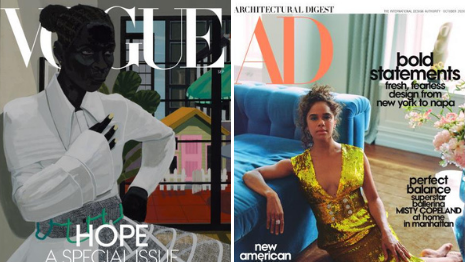Media group Condé Nast is Luxury Daily’s 2020 Publisher of the Year for its empathetic response to the social causes emerging throughout the year as well as its activism during the COVID-19 pandemic, all while producing quality, engaging content.
In the difficult media environment of 2020, where advertising revenues buckled under intense pressure, the publisher responded by adapting to the crisis with relative fearlessness compared to rivals. It also embraced an activist agenda as it put causes such as Black Lives Matter, safety amid the pandemic and sustainability at the forefront of its agenda.
"What continues to attract me to Condé Nast is their continued focus on great, interesting content,” said Vincent Krsulich, president of Martini Media, New York. “Through it all, Condé invests and believes in its products — the joy of Vogue, the satisfaction of The New Yorker or the inspiration of Condé Nast Traveler."
The Luxury Publisher of the Year award was decided based on luxury marketing, advertising, media and digital efforts with impeccable strategy, tactics and results. All candidates selected by the Luxury Daily editorial team had to have appeared in Luxury Daily coverage this year. Judging was based purely on merit.
Content and mission meet
Now firmly at the helm of the organization is fashion icon Anna Wintour who has been promoted to Condé Nast's global chief content officer and global editorial director of Vogue. In her new role, she will lead the company’s editorial teams across all of its global brands, with the exception of The New Yorker (see story).
In addition to Ms. Wintour's promotion, the publisher also promoted British Vogue editor Edward Enninful to European editorial director of Vogue for the U.K., France, Italy, Germany and Spain.
 Anna Wintour has been promoted to global chief content officer of Condé Nast.
Anna Wintour has been promoted to global chief content officer of Condé Nast.
The restructuring comes at a time when Condé Nast is making efforts to streamline its international editions after merging its U.S. and international operations a few years ago. As the pandemic hit the media industry catastrophically, the company introduced pay cuts and laid off staffers this year to offset a significant dip in revenue.
Despite this, the repertoire of Condé Nast titles managed to hold their ground. Vogue, Vanity Fair and Allure all published just one issue less in 2020 while Condé Nast Traveler still put out eight issues and GQ even managed to up its publication to 11 issues from 10, according to a recent survey by Women’s Wear Daily (see story).
Signaling that print will not fade away, Condé Nast is adding a 28th edition to its iconic Vogue roster with the spring 2021 launch of Vogue Scandinavia (see story). Preceding Vogue Scandinavia is Vogue Singapore, which relaunched in September with an autumn/winter 2020 issue after a brief run in the 1990s (see story).
Diversity and activism also reached the top of the publisher's agenda in 2020 in the wake of the killing of George Floyd in Minneapolis.
In one prominent response to the Black Lives Matter movement, Condé Nast shelter publication Architectural Digest in November launched a digital showcase featuring Black interior designers. The move, which is the result of a partnership between AD and the Black Interior Designers Network (BIDN), showcases the publishers’ commitment to inclusiveness and embrace of online platforms (see story).
 AD launched The Iconic Home in November. Image courtesy of Architectural Digest
AD launched The Iconic Home in November. Image courtesy of Architectural Digest
The adoption by its publications of 2020 causes extended to Condé Nast Traveler as well. It launched a new digital hub geared towards affluents who are interested in resuming leisure travel amid the coronavirus pandemic.
“The New Standard” is guided by five principles that luxury travelers expect hospitality brands and destinations to uphold. The editorial initiative was inspired to draw attention to the travel providers working to meet those evolving expectation (see story).
The magazine also introduced the 24th annual Condé Nast Traveler Hot List to cast a light on luxury hotel chains such as Rosewood, Mandarin Oriental, Ritz-Carlton and the Waldorf Astoria at a time when global travel was mostly curbed due to the pandemic (see story).
In other news, sustainability emerged as a mission Condé Nast embraced with gusto in 2020. As part of this year’s agenda, the publisher aims to become entirely carbon neutral by 2030 as part of its long-term global sustainability strategy.
 Paolo Ventura illustrated one of Vogue Italia's January 2020 covers. Image credit: Vogue Italia
Paolo Ventura illustrated one of Vogue Italia's January 2020 covers. Image credit: Vogue Italia
The target is the New York and London-based publisher’s commitment to beat the Paris Agreement by 20 years. The company will also transition to 100 percent internationally certified paper by the end of next year and end consumption of single-use plastic packaging by 2025 (see story).
At the start of the year, Condé Nast’s Vogue Italia highlighted the environmental impact of high-fashion editorials by opting for illustrations instead of photo shoots for its January issue (see story). The Italian title also debuted a scouting project for innovators and startups focused on responsible fashion as well along with Richemont’s Yoox ecommerce platform (see story).
In a parallel move this year, British Vogue named model and environmental activist Amber Valletta as its first contributing sustainability editor. Ms. Valletta now leads the editorial agenda on sustainability for British Vogue, pushing for dialogue on key environmental issues within the fashion business (see story).
Condé Nast’s dedication to sustainability, diversity and the pandemic was laudable in 2020. However, the quality of Condé Nast’s content was critical in helping it weather the current crisis.
“When you look across the publishing landscape, there is so much talk on data, insights and commerce,” Mr. Krsulich said. “But publishers must continue to produce unique and clever reading to succeed.”
{"ct":"S5p4v52McbkkkIF0t1Ir53DmXrQiGAbX3IgW+T9U\/e1EvdzJjfa+0SV7oSCmnRgpZOqnvSOcjECRFNsiPe1iD0fbw\/yjykkqYXRs+jUCVh7D+N4dn9sC4SszZ8bSASHzzaJaXFYKOW+rR+wsIgBEizXW9cnsSSjp1jXwRdTdYskG4i763epBlmoEuC7jNEi1M5EM\/mIfNL1irF4tomyTOsYCsJVEw0DFVOv6zPA+swSMuBeY7YbQJD\/LB4LqLD06IuxbZqr3+N5fCtaVTWrbRtTbnYUEtTnz+XihxtYjLf1X5uLvQDuIr4aO\/s184tGmYiKdr0g7pLnS3OvcGeQB6+I27utVQiiAzlFoCd7AY44PDw+QdxUaVvmb2wHc2L2YXcGn42P\/MT6+zsSgWAqOLZq3NQLIy45waom6AUKhFd84Kvwr+rfHqKCzAzt20gypFoND2KQ0arxz8f3OpPrYAlRGxsZ+tG02\/l1M\/kIBmKzIImPSIuHgpBrAK3Mp4WIR\/Us79yEapS6OsNO253kbyXVi8Bc60lovFwdDkpGuw439h9YfgA6X43q4XvFS6hiMmMJaQRS6LfTxq7vj86PgQ+Bom840xFANx7kGo5s55PpmJHk510\/+uQBWqKnkrbTjGIf34wBdFHAlml1kdxuiOQqSoErB1YGQm0a3vN2ZLloGdLTcbg4oFZn3RJJMVHuGTOG+CZedlzmPyzs16Putxv7Udk5WhAGm4ExbENa253cLN1Zc1hKDUpANeGwjUQNEwkXPuJiysGc82AVfMMTfj0OveQKqUodxQPTpVU1QvojFPlweCekWgC36btlKtXBAcYoSR6CbbKlFUBfTMMnyRbei+cH8+har1C1Ne+IK0MtbuWWplBQex6zCMCbeEBjWcnQVRbEAcupVgUXaGCvYYaPneH41WbwgwHJK3qTwcz9M9tHBr1RnT8QqFo6c7AwpXBnLMARf+uN4jR4OYwg+R71vOOqqD4yJEKG9juIhs8c+RHFGl8zp5gPoKxjooZxuxvK8mHGM2VUs\/OZTeLZutdNK\/ay9Qjf5HsX7N4BnQ\/iRAMqbfN2GCfg9LH6WJ85kc1uo6LCyA5CjtdNHEk1hrzOjCk2NnuF\/TbwbXNONViLOw2Cd3AW5VVw6mVFmB49ROhIe8cjD10529auVtcfHFN2fXFs716NkHLG2DCiSq6p2aWtqbRvaNxnH33Y8bWyxaA\/SVeEw8xej5ghrIf9A\/gTzpEeZ6hZ61HqmTVSgYhyFIH2Q9XimT7JeVeAE\/U3iwlYtfzfv24B7jD8HoWnGb\/MnsKShRBUyAlM7pvarIQe3q3b93c8vgGRY3d0WBcoYuWR6uFliAWw9Gu7Aqe7LBMRUIY9DLcQmxgugAKaoaZ56fZw68C4wMDEGrX1W\/RhH\/1vecp\/8h2CHP5HDCPm2YA4kf9Q7dYkLzj2MfledoyWNPqbVefx3wnzvE47hcn\/xQWjmCIleOXqwutAM9DRpvv+MzibuKgGind2dQqvcZjKXNzlqFFnqXUMfsPADK\/+O0Tp3v+wziQonzxXo4LyWn4BOvwPej2+9GnZ+xqUEOSvrw07Io0K6b+eXQ9iGlpeWKPjfTSNpLRW9UUCb5RoXDkSJjHoI13JVpOfRhy73S5Tv4bvsVdCHKB8tIIuu81bgV+kUtxYaVfZBgkOnYyBL+K3qw\/qJCZGsEnhPLVH1CrDWn\/NSvCT7keLbUEVYaSstcrJx4w9v0nx8bfK9De3B7NMXoIaYN6u1+GJiy2GTdKjGLkrXe+CpJz77FBWbdI9UnM4jpaVV0\/RAJYo9T\/WuU3H6JJbc80oRnOx2loVVpBJn\/UybodD36zea3KiK68RmK2mUqAXytz2txhrfhnVV0rU+X8z9loHpdntshDJhrBQ5XQFAjTVWfowdBguSuIo3tQISY6mRBFgoT8CJEggQFECOS+3tv3RcoPvAfBkbbwl80PdLs7stKJ2XMRirCVl6oEVFGJ\/6j8g2Nf1xZmFnFo6zVcc6kWRarZb9z70pe4tjjWT8cmrrvtNlgnAkBRsjEY12Fcmrem5MclMgLMZ55AxSuYW1n60zqRzXOfogkD3IodLaFxf9\/FiUCZ6pjnmGWoiG9iHwUfG6XeovVEVQ4DDdWxPFQD+It4donUt4Ap7V2WH5lSK5Lc8lEFLZRISQAgEanonEEFjIT5oZ0fxxlL6RFD30XCS56JJQFHmrPqLHWC8Yn0yHkRAgw1IJsQSpzr1VU5l8VNlWkH1QXqpZSr5PE9aaPL4CJHjfSMQd1V6meR\/MOx18Vt7FoHWd1fc91MPhXmX+gQX\/lxCfr4Y4jaZb+aNJGe3ns31q80dktNuR0FRA99BtihDuL3McXIQqOpLx93aezL0V8amOLCKqYVcvt+t8\/sIldEgrYXwapWysrLf76cKhEsAyPLSa5kY3UGLy8JKKOtLVKZyqwuKNabdKK0ULzdnYGRC7HclmbsX799ceSLh0Lfyx4yseiK0esH1Wd3WzziUauAucMHbPHzZGgW3GLWhKJq5qAC5S9HxP6vvzlhWXIKMjeUhKKecpQVlf7YCbI0RMhSs6gaO0fhrIzLMCTlj78Mf1yddiDJwAmOftep\/QwVG5fs8F9a8uktKjy2ns2KmVyAtYi477E\/lzuBqYtD0ObOHzO1jsF0aFjCs5yhWcHk0cIHnz\/NqA73K8JPUU7qoPgBN3SfcND+5r2\/ZWZa\/GU7McevEIm3N9yoK+CIy77LlmdoljC5Nre1q4Y5ePC0RcbT8V0jBWFGG3yfmGzNdY9WAeDPoZzVpJenR4QDZJyeeZvc+1LtUqHttdnqjC5mJVBe8q00ZOPzlAte5ogXPVGH+JfUKj97rOO7OxSjMlS4vr2jR+69sLE00VDC340PMeJYkWIbbwWyPjB+gmk9x3w+jV6qxy9FwDXCHLij8o3mtCItvxtiJdMiBPAbY+zw4v+GPYmTJAogxmfojfBQ2BY1V1NE674R\/o6gsZ93oLAPpTyCSIe7i\/zSFkJVRmw+8YvNkOSBEMEYZWPtTFnRQKVAIGIlpKjRLpj8ryGDhxdLgn97w8EVc6SV7GaHKFKlzeOKpkak6ScTXfR\/OYjNrwJflMzbak0NeZZbkErcPn+PmuOvjQVIBM0PxRk6n6Oocuw5HT58zMfvIMy5uknCdixRfWu3uJtV6ais11jdPRXP7d0C1cwPPSbF\/zdFeDkgcXXpqZ9TlV1JwMbIYwKk890IGrb27UY2WE4KC7tglmmitEwlkUrRvaM77IU6LOQj98U0qSdZ9S5Xa7P7kR8zQ8IfOy8+STZx1M\/v6I0aAH5W\/K\/eYjAH9NytPEpkSLfw3Q6nHO1ltlgsfzf21BqsR8GW+moCkfVe+B6sC5IiJHfvEUFbME7PXsAHBy9Q1w0uXk\/qhEOsGw6C2IgqHy0iQ7hlZ4+9iwj+HOsCTRHtiGVhhgHXt+9BpCeXglGKcM9i1iy1x+2W4uLYEHg+Iw4QNZ3YYLyyQCe54wrgsLyvVmEYkfvjpsOzlRFnnZLjFGni1IGk9SxGGjPOs+3194gLyP8BhCwmtz\/s2TDmVKL+apiP\/h0RtoEVqyDOM7SHL2kRNCHlMSqD40cAegNjNQ1dD2lXKW+eel9vwno+19PWcFonmroa7Xpe9Ga1BGBbhjTK0cAj66je7tZZ48+da3UJ3OMH9VpIBNgmV9BOmqyUENG0tjlZ9GXgI89MyXZuA9pqGgFO78gzd4h2krTSziPqxo1UIjIiIzV+d8P6oLgbgM3zLvu+omK2Lpnru\/TbL8DpIizGUf3lkZsdkoR3svOCbBSWcjFw7RLEpDPcBY2cF7hDk2+iFQWJl2orP2nwSj\/24z73PShZhth\/9XRwwYVnOjG21W\/cU6Jp1UYo1HOdCBhoudSl8458ir\/RfuLvwuGpQsZJ7dWpA6RgafyFldXullkTIRKR7\/s7RKMHR5rKc2NRfRek+HvhEp00Kt1iggWkUHZ\/1F1aTdqcMok1J\/kUbfjL1TyOuvH8FjPEp7AUAuMR0XJRpyJzXUdjL+R7UDC8oAlXNYKsIg78zKPU898UyC5hGZ86X657KjBYOaxRRbmueUvq4JoWnHlCUKmAsqr4+YsbGca6X8sqjK2lvtIktcRWsvCHDT3Iu8IyJFO2MeXx9P65wlZfKv8Pi\/oXsUlIoObQKxBFEk86Dpq2Riog+dt+CSurpm6VXfd9QPZltU7WId6vsM6D1TiI4nE2ATDNw9xvEDZnoo29xaQjNaeemabtA2cCujikJN4TkHTPl4v5pZymEjjvWnkrdM6I4hvQud0jjPPQrcfh1RfEjkTTfPEo7AyU0uLaJzCoo0uDsYLnNiNxhU1SU3heuVKGWkZQWrnUro+XGyN2LCM+k\/GF4Da8PPNs4ABQtwCvtmBFRv6V\/ppd9vnKKJOXdzHopQvVq6VNj\/kUn4W732CTAOBK8ENTEnQwpXI5Vcs32fPLVKbQWmZC1bDP7BfJF0ZLMJuIuSPGpJymn4sw3F3ChzMpuZGuUF\/RvDI0YM1GND\/Zd5tHZUQhSfLwUFZHJilHmZhZmQxUlTuvlt4JYkxunOXkgDj80WVWnUr6jGYZamwPIAxSxUhaWBH3hfh1YlEZqa5hZo\/Yp8h1iR4S\/z8M2vLwlfx7d5mOquez24eg4zXscjQnQUXTVE91GEfOSfaiu+H5HH0+prudVI1O7t0P5kvmY2C+vFrtQHf+dU88Qk50Yub6OcgEybpF6SS5xUJzT9Di7dr4jAKlut4Ch9PJxIrTuEsjUPUYCmolsoPI7gE+vA3aYTCKZmGxgObdmnCoc9rg4s9LUx3n1fBJp4\/4Claq5N4sYnwOtR+LoSy20Srvy4cKC7x+K1wXX4jKENrY5PcCFNHTNxsMJTn1LuGiGwSDW\/Hy0JvevPRQrD+fQMnygyyUnuBJeA2FhGG1+WZOu6ALSB9ZHVXEwAsLIcxjqIrmyVW30Vi0Uzr\/RUw4IAI6W4Vvezhj4z7\/TOduEFBy7ESWcy8oRduRAajS1K3BE8LjL\/FUQjU\/8fEWj5MPFgpM4IEVvs2x3Y1gLttz8Qw9AlEnoXoyYPY4PlKshMBk8azIyr9vrhOn6pcLWIauxeRRTPXq5SJ3FR8OdV+wLtnL2eorEPhQ+K2EF6q\/FnWgU16Dy81BzwTGgDxByJJO\/4P1LfhvJDTjiiwN4lKxkHMI9DZkD1H1z4z0QISkmZoL40R4MRUygSFvxkJQ0dgBQpMvY4CSfpBj4AdYm2iXlyaeVztkW4UVylxSvHyije6omNMag9KhNSoOHSoySD5KCSKH+6+xamxH+y40vnV0Y50EH4sYn32rPxUqhuaznUUn44yVkWwsc5gyqsZVYq7BLW6YWohcxFlUTJbdq9v1CGQlSbil6Gf6yJlYK\/ZGOAs7+yc8GeQPMqCoCIXaqJb9RJcbauIrlHmIpnpDIC6s5GtvGtOWNBBbp8AzKE\/8F\/DkLIecKkCaDMWdOkzC7GrX\/UVvTNp\/Okim+SnEEg7RVdmRWWmUu0ak+twLmGhh+QDkLlHegdYRhMEA5n1AwWHMu5jRan5pZQfW7i0l8oSzv9tdXO3aGe0eta4vrw5AEqcG\/9FHl94scwJlcX+UVTGAdWG8TWkjTC2OygsTmTSN6rRO9z9miju7gMM9al1hvLi\/\/iNmA1BeGXE1sldhGyXCNHBFWrBouKe+o+kTvUn4Za592PgtLq\/37urChKFyINiagB1OMQSwYVsqWU4yLW1mhktPFY6ZE17e7TtwMrsBOiULxfYRWCn1eWtzYbSry0ny7pfOuduZDD4hCq6Y2VEyPijq1m5biahm\/avkiNFP8bl6BrA2gUe7sDvX7XyHdIy8Eii3ZJxbFQYxuOe8YOx119ItesRNFhViTXViePLZ63NEp2IZkxOy8zEYIidHouhK6+B9V7wnnsFh1+zV9WyubxpmMSd9zLyb1JpILhybGBhWjYIcpDobrQp8iHAHrKiYc0Yr6na91aTVU50K2XRTSCU\/DMyNFzSC7cIh80236W5H1Oxu6m7ZAyFSlpTOc92HngXPL6gGpFIZi75zV+L+Ap+h3rNAT6u0yRqoQ8ZK4Nsa5g9pRpX6tTrN0Drs+R3\/YyWx7vi+BiDxoKE0pI4svxxPWgBSd0gf1D61Lp39xLH5NS0diZjXub5qhoOK+kZtH4eUtwqBtLJXEZyw8FmepmLj0GsalOgS8GWeLGtu+3iflvqq7HzwUwsrlHBW37Xo7VKdbLBOy0cUX55bUo6fQc9sgIqkoqm9cUtFQEgEwLvz97KswzTaazoYLnvUi8XbyLmhGXASK2YfiCE9\/kVV1TpPTvsiYEZ6c013ovncLu+GS0\/R70P8vTrhxZrMet2KwRrFn6hAilUEh2O3e+rqIKNi4j8yRcLcA1DnBDrb\/xdw0leNCbsEscDomKqOLYnczcx3rznok9OlmMfWtkbx5T3gvLK+bdrPtJ7PYeGrR5N3mIXFOpzwnxa1oIrDN+l9fb3K1ZMAqYf4dRYaD4uwQqanDuxzx\/STlJJe+yqPRiFxGKna6v2mk8fxUrKv3DoPAH3xpBPDMYLvmuoehcId+90bwzs2CKI2ThGJT1\/IAUJvb65RBE7jM0X9VEYh8aYv+sEz76AV1JSFl6g6Sxo3mo7nnjbQZGdR0+XfKCi4Ei27fFyvX5S5TRYZkRO\/WJqxUPFr9t2vs0+uvSeAwGVKinK2utAhkF2IGVz\/nEo2p9JFUVH+bpzGAd\/FZ8Q1EW6BHgbirshzZqVz1Rz\/xxaO+aPWCuhft6XPnBz\/90GqqKoJtLrnsnnvfw1dFSoehUT\/s50DzXbHOOkA0gohZ+wBe5\/EYLQ\/zCxLDbp8Ex7z3VfU8032X\/VFPRFveUiPOHQux8TCdzJBjNAVebL8xTHOEIMynM6FRuW9skcXzEVAf5bJZPlY\/RqeCyJN5gzAdaPkp74KyuDpblOnB2fecNYtHuVTS\/jE53grVEzDOeG9f0QwISQH4sxNu8Ab61CIEesjeIejhcDujIPCqUzcjG8Y84tuGEbcNibLAobOvTXvBr1QDYtctWJPXRr18c90fuN5YZdJXO7gx4AOpfP8A9b6YEdKGYVNB+07m7NEwgsYvZu+NTAhktjsm8xvXI3kAE0\/+S8x1fc\/t4f9TZShPOGcVYNeUOoSCwmw4j15kUr8wg1YxvvQb4plwx4pCYedofW2Ps3JONV2sFyqpndeTV9epgPxYydbUe\/Z+5fQoTv8AEFKWKsYWNO2z5vzjP6Ui0nVrteLeU2kRRs4YkQsEWNJ1qWBN0BsOnmXkryoo5MtWjyPHdXXytJCEEiB4vRAqSOqM9wR7pCi6UuoPKteKcPcQVArQWJ4M5y6ONoM7yr9AGe2plarVdSzrGc4wDInUeQIbLZCT2lK3nuvmIqJS4dXkDi10R\/KsKkyWoMJUAkyC6GeyoLPquWkNTjJewBBmJyqAuD671Iat\/beZ7e01EiZ9mzZsK3IrlzIITIZMrnpB2M5yxJQGBFx2OW+pFRd64FuI5suDNZFKGotWpUNS8XxdLNnV+QDMR+CkLfYLNEmOcU0bOJtYWdy6hnSdZGUSDyLhzQWRAC+rlOMEFU8FmxoYD0dnwSYbbmWuPCudZ6ZMw5y+vgktG9dyTK2jF6uD1Hfpktcf+O3EVKidKPHPw4f46g\/pmIoS0tdkWFWmib35Iomf5ba6c6StEXsd28Bw9aunpnAIrFyfAGDbHStDmH\/cnFiN+\/TFCnxdrkl3v6Fy1E1CxEeSMLFDAJ7zO5tM8Vdxx6zVR74+Hk1IN1DDQyp64unzXSPUeJwWfuIwU\/gJv9X1z5hX\/s\/xtuvEk0QNZCPuuv9VRRhnB7jO92FLUJTHIO0aoySsVROM+Od6SnxPRZpq\/0DIJt7S2TF6Dx5umbWr17tOftSfLWw1B1E+x7ie92uEysPeVW+kdD8ET\/42mGKSdupLDszqmkC8QLgDPdSA42mECJlF15yRoatn3ZUulQxYvR65Hve7OIf9+sIDZBN4oWJqF62DVisxL33M0eegnBNWso0YUKPk0XLlzQWumGo6KySFyGRL1IK2WRTkC76RfQrV5+ClxLWYIF1k5I5Zjk0v5K4wSybUkjwUwRLT8TMKU7JbTd+aVgc6pd2gt\/+Y6Byy4FXzydfoEtqf6sDQM\/tvhesibm\/ekdVao6rCNxo9EjO2f628oQtHzvQXxYoL7iMJ7+oXUBKpfwK811+1yXqWLZ6+ZQ9pvpUQcnsbyi3fSirq53TxRLOBW2uiolXi+0ZDdFhPiPgowvxjcWVtPaQ\/K8LhtYyDnxsRuTm1TXehm2VT\/n7KC6u\/\/34v8ypQY7KQBJ6IlYE5TupGoFCS1s2ie9TrlRtLloRg\/Kf5g9qtOV4Q4k\/A76V0vlIh6AswbE2\/BqmW84HCl6hPbf1UGsqhj+srq+iHBjg8AcT18t\/bAsUIDX2od+wNTrz2lqlytt5615LOtc\/lvwAsIos2nP2GgyLvORoRWZEsdH13tCRzhRYPUX3g6yySBoxWVDR9yCiTLY08hiTod6MQ0DCYvNuKY2BJMm9IFDXYs4ZYVeabuBJWISIm2eqchp\/ldiCZcK9pJz6QOFolC0FrR39dhAp3JvRQDUjYyD9SDcxrWbOtyxtUt6JwcHvyB0ZXpp0aE3\/kLMdoDtEgXy7sH5xHmOw8mDO\/qo4lrxZsE40fch8S4SbbK\/jNQxWI\/ZF0k\/QeyMgtq5aqBx62QES\/t66vVQx4JHY2vhIYF2xMxXxxUm2dxtP+YP6sEOIzUyGMMhNgNVbSl90qwgZBV1iS2w2+RKB5hiAxeX2Dgh3g\/CO42mN27sutaGWgCRywZ09CayWCyhEJ5wgLuXnKOMeMORo\/7ptE6Tm+InzFFuigYxmT8sVsN7wA3mOFZ5iQorfEuO0LGwxujbtSdPgs\/JTgSDabuT5xPuQzCXtB77FUU7nrly4JA8uc3ppq5tgVu9grcYRmEFVSA4anu4rZ+o8Jkr+0yP26SQHrzXdCTLpgUH8JzNAtGe+m32yEwPpjjnJz5cFbb7WwLmzPyaK4EW0vp4\/UnSMP9IcJn\/oIuqXVPjvdEUw\/BscxeUXphy51CWolwKjAjunG7us7EuykDPxEzfLSFnBAvXd55EduBxP\/3zg8dryghtxlNJu6GS5xKK5Sa9N1Nk6k0a95Na90xQEc5SOh518+wBltDYFtzn6A1\/AIp4pzRlON2JlbDt+3qer41Ah+R4Y+Xo+u5R2KPH1IBjP3Nj2EfO2dEM6S3ALBHaImWEcurcT4gRhuwiNYXYMy1lu0noS3B6tZvVhHf4Qgxr+7hhPKpOlvnnn5mHzYAp7FZ+KtGMqUmrkYty4PPUvxUWHl3KtaitSJ0zG8uP6CdKZnpCCQ5h5Us4kIF577eAibQQ\/zofi7Y41YqD0XUDBF0fLhXbDsQBNkmBeO84OIjuLsQzlsnQ7LfvCyoVkdHT3OxY57+JHk5qV1DSm0JkvP9hqKG9FBgleUrShk4vCLQacEFpAj1yXjAa1AcP61A9S2wZw0hdLaT7dKQ9bV+vTcTOO72O4eCZpoGpsYw\/rO25y989MEKyFsk2VIk5yJXeMClrWezF8anZjCo86vYNOJ7YY8fWkbLVwODexDZZjgRhep5O4K1OByCiSh01LanA9vwe2fmipuVf8GwToDkhNQy1Z7cboJ321EXq6C9MW+b5GxNf3EOgHMyx6NwyRAzWnSy8KewB7m+MLLNprCITCjwLiZQT9nPM2Q2lOnOa\/sygV75XBkJdvC9SvmbmA\/TnQG70+bSreuJQFH02HA9sktY4Kfvk25wmbJhIzTbdcMnS\/arFak+e\/88H+QrjIc0lEFmIENyLIFdFXL25I+gJWukjro1RiSdxKPmNzQ0eNejCCLylUshTuFBfsOQjNTYPc2pPN2AESrptD6GFHexUfCYBR1jQP0xYSCI5Io15NupKpn6WtHol+3S5nPNxACL69w\/\/yKNo7EzFU\/HXjUQOcmStT3rK\/coSMYIIjdaZ0VSzmI1FoK57lwACBPzMv4LhkPeABdsDCPYLp3uWpRmi+1NJVu\/gPjCVCDJPjAYoMzhQP8kgwQTkN3MBjOVrd4XiTUISdX64ayXxkVHySkXF33j6TiIByDOkn+BeQQ0ONfNalcVUuZK2R9R+hHSjFWjqaNMJT3PeBP1\/KnTKO+P+XdXIhnmC5Seu4ydcTmMmG+1s2ku7N5QplLYzTzqM\/twkRYNIz27rtDjAV1\/yRxs8NMuhg3RUidRIbKWffgnplb2G\/gg2myBAh6snfv8oqjHbfkiKcTx\/lXs8544frJtm0VIzs5nPJCgC3ILhBD0jxDjQT8vcAJXBVEpf3bxTq3luEl3KWUrZPvbW56OY6NptPXh+xMzj6aHtWBHoQWGhbYPgl3F\/lAdLKQp9tQkjQN0lHlwuBn7zzFpuUK2FPORPWzQksKPAI0iKbDK5GteW+zpPO9qXkJAQpPQm5PBM9PqT79xREQuIOYUCwCUEdecDkiQ746kTvavusMGyMzkHoxw00k\/vs7klQ9F+qT8DxFCkC0LSdEgj3YgetVsUkFDFReTB523R28v8jxaVZRzbCAwekFFoG6uhNK4sXS0HQWeu3wcLzLGd5siz4jOhW1eZFDB+9z5x31yYoRZ58POJJYOobwq9doEZjYVAEAG55tCMm6wslGv0aInjo0cIlmZEgVQgfwoNRQ6acgwAOn0gLZg2e9UUXOAx6FKLz2SLtv86junMGEDyUxv3guCBn28xoB55hVJG+m1wTZzeNmVh90Pg7wgltuAtWIQRAQ9NOtaH8ZknVVyQymU6302pW7ZifboFdXUr3klcKs\/iaBpbtOcEZ6nQd4ZqbtAwxOEuXRizDCMpV0BfEl0nYhMjWqk4E8i7SckiF6BdQfphhnktUhvJiHBfZaJmWoY\/LfTWhf3CswvNSG1tc+MxcmPaHi2CsfPIvx8hP35ISw0\/fMljhyfoSVyGfkNU7mXXkGv9r1zfosxxHv4xCEHT\/fQWtRVdEdps0Sn8A3+65lRowgwmnkF26d8GQ\/gjnJSYobgiisFJcrwGi98uqfddeVo2r85Kp5Gy35n8iK82tVrI0bIWEJlFb6PxIuplD56X+PtSiELiy0fq91elQyQfejDsNCKE2QNBGqRehcDI0uM8nbOUHJFIMOyE5zKw7l4KrEP\/CDuURpfo6E22B+QeT23T+K+hF87q8BqGPsHpSzAziYebWK5ZzAzBfBPJHLvhS\/7GW\/hHYGRx\/Emq2Juki0eyLEFo1brWmjwAcMxm6yMK28XtCbNWJtji\/k7jSRtY0cAWhcQ+Pa3Yy06Xb7t3Z+MSg7DYopeyiYqg3Dx8JL7qFJ5PrMt+axrYCeC+ZSlGFZed\/HEnp2LYqWTBQ3Dc74nUcIUTKUg+Idr375BRfWjdw0ZxQ12UL0x59kJZuvqNWuIABV3O4tWMkd18z6+Ltdq7S2G1ujulGr3kqs0EWhJHv91IJO7QR+krHuj92FCpRbUd796SXFUK9LFa5CFexRQkV+fLCvDYArnIp+xdKPbeoMBcJcrb3piCFPbksH1GiI5UVFtHc+NA7cFzzMClgBovAJFgnyzlVKBcBuvx\/OKnsc9CH1t44LS6gOFqfd1i0iP7yuABFQPPpgNz\/Vg3uzJD6MgaYr+ZxPIDmdbM59u84b2bmiX9xRZVDCMnaVoXlB04I2vw2FxoGJ16HZMBXsT7TA11hWzC\/LzTuwSxKfNnaxm+yOASODJ1oAGaXyQtQO3ZmBHlMTKq\/SiXCmzEpJNyEY88eU52C38FSOTeMyix9350JrFxyXgYXQvawpL69PCiCCChpylthx4Wu\/H1uClEJpsvDPDfb3x\/3EHKTn9SGMI+Up6Jh+PAP6O3lzJeK47knK+oSjgd0DD4tN3dGe1ZpLSOwk+DcisGBK9xqVpJZ2Zl8QyrIGJEeVUi+MYaTtcZETvCcSJXbXsi5iQW0DuN5q3NmU3dTuGN1TmqDZqZA4qyrgHynm54BxrgIKvrb0TwP1KnsVnBkytrnFkjzU0sIO72GD1qlgYljuRsED4F10+ZicDbMsUgZHBsPLVtOxXHN6DN7ZYRdsQClwbZmY+48oQK8l3lyvPfm5eE8v88sVEnmrO6t0+PVH8lOBrELgEOm3n7xLx+AiTGOIY2dFklUqKmL1qo8u2aiYrAbbwc9bGo+LIIBu4IKFou9mDV7nhZ2TXGC1B3tdjvHz\/nP4xi+tf+enWcxJC3q2XUYv2nCHPhvY4XrsG49IJJXRI7w27AIsg+1I+uiufO46uphcIkFtyxe7mhNPuOV4d1xFCyTe6pw0GXWBEfXWw0zBCkaYM01WtA\/8R2Ua3FO9ZhbrEZ9McMCFdOb0ekre0Gkx9QYleIUU\/JPPjJ5ngu96nsGzfv3NuuVS63MY5FxyEf2ehgM3fM28ZdBP7tGL7tKVLVmJTAaEf7fOquJnIZNpgHVtiXGB7FQhXRRvNY\/X9RddOh25vutx\/5ao7a5aHGgyq3wxvwA==","iv":"ddbb478b2717b0755773b288f0f65dde","s":"f5ed43a5c84ef3e1"}

 The Vogue September 2020 cover, illustrated by Kerry James Marshall, and Architectural Digest October 2020 cover. Image credit: Condé Nast
The Vogue September 2020 cover, illustrated by Kerry James Marshall, and Architectural Digest October 2020 cover. Image credit: Condé Nast  Anna Wintour has been promoted to global chief content officer of Condé Nast.
Anna Wintour has been promoted to global chief content officer of Condé Nast.![]() AD launched The Iconic Home in November. Image courtesy of Architectural Digest
AD launched The Iconic Home in November. Image courtesy of Architectural Digest Paolo Ventura illustrated one of Vogue Italia's January 2020 covers. Image credit: Vogue Italia
Paolo Ventura illustrated one of Vogue Italia's January 2020 covers. Image credit: Vogue Italia